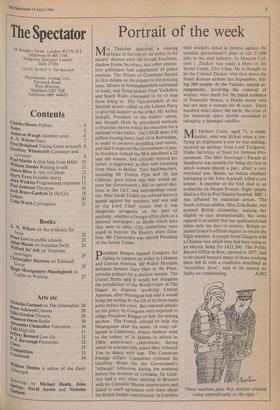Portrait of the week
Mrs Thatcher delivered a rousing defence of the role of the police in the miners' dispute after Mr Gerald Kaufman, shadow Home Secretary, and other opposi- tion politicians had complained of police excesses. The House of Commons limited its first debate on the dispute to the policing issue. Miners in Nottinghamshire continued to work, and flying pickets from Yorkshire and South Wales continued to try to stop them doing so. The Vice-president of the Scottish miners called on the Labour Party to give full support to the strike. Mr Arthur Scargill, President of the miners' union, was thought likely by procedural methods to frustrate moves within his executive for a national strike ballot. The CEGB spent £50 million buying heavy fuel oil in Rotterdam, in order to preserve dwindling coal stocks, and said it expected the Government to pay. In Northern Ireland the IRA murdered a 22 year old woman, and critically injured her father, a magistrate, as they were returning from Mass in Belfast. Tory backbenchers, including Mr Francis Pym and Sir Ian Gilmour, gave notice that they would op- pose the Government's Bill to cancel elec- tions to the GLC and metropolitan coun- ties. Miss Sarah Tisdall was refused leave to appeal against her sentence, and was told by the Lord Chief Justice that it was dangerous arrogance on the part of anybody, whether a foreign office clerk or a national newspaper, to decide which laws they were to obey. City institutions were urged to boycott the Reuters share flota- tion. Mr Chernenko was elected President of the Soviet Union.
President Reagan blamed Congress for failing to support his policy in Lebanon and Central America. Mr Walter Mondale defeated Senator Gary Hart in the Penn- sylvania primary by a decisive margin. The United States said it would not recognise the jurisdiction of the World Court in The Hague in disputes involving Central America, after Nicaragua had said it would bring the mining by the US of its three main ports before the court. But renewed attacks on his policy by Congress were expected to oblige President Reagan to halt the mining anyhow. The French offered to help the Nicaraguans clear the mines. A coup col- lapsed in Cameroon. Prince Andrew went to the colony of St Helena to attend its 150th anniversary celebrations, during which he unexpectedly asked Miss Deborah Yon to dance with him. The Commons Foreign Affairs Committee criticised Sir Geoffrey Howe for the Government's 'lethargic' behaviour during the weekend before the invasion of Grenada. Sir Geof- frey had a very short meeting in Brussels with his Common Market counterparts and failed to reach agreement with them about the British budget contribution. In Lorraine
steel workers rioted in protest against the socialist government's plan to cut 27,000 jobs in the steel industry. In Moscow Col- onel I. Zhukov was made a Hero of the Soviet Union, First Class. He is thought to be the Colonel Zhukov who shot down the South Korean airliner last September, kill- ing 269 people. At the Vatican, special ar- rangements, involving the removal of women, were made for the papal audience of Pramukh Swami, a Hindu monk who has not seen a woman for 46 years. Three hundred miles above the earth, the crew of the American space shuttle succeeded in salvaging a damaged satellite.
Mr Herbert Coots, aged 73, a small- holder, who was kicked when a low- flying jet frightened a cow he was milking, received an apology from Lord Trefgarne, Under Secretary of State for Defence Pro- curement. The 84th Sovereign's Parade at Sandhurst was notable for being the first in which women played a part, albeit a very restricted one. Bindu, an Indian elephant belonging to Mr John Aspinall, killed a zoo keeper. A member of the SAS died in an avalanche on Mount Everest. Eight people died in a fire in Port Stanley hospital. BBC 1 was affected by industrial action. The South African athlete, Miss Zola Budd, was granted British citizenship, making her eligible to race internationally, but some regared it as unfair that her application had taken only ten days to process. Britain re- jected Greece's official request to return the Elgin marbles. A' couple from Glasgow sold a Chinese vase which they had been using as an electric lamp for £421,200. The Public Record Office at Kew, opened in 1977, had to be closed because many of those working there fell ill with a condition described as 'humidifier fever', said to be caused by
faulty air conditioning. AJSG 'These machine guns Roy Jenkins ordered swing unpredictably to the right.'










































 Previous page
Previous page